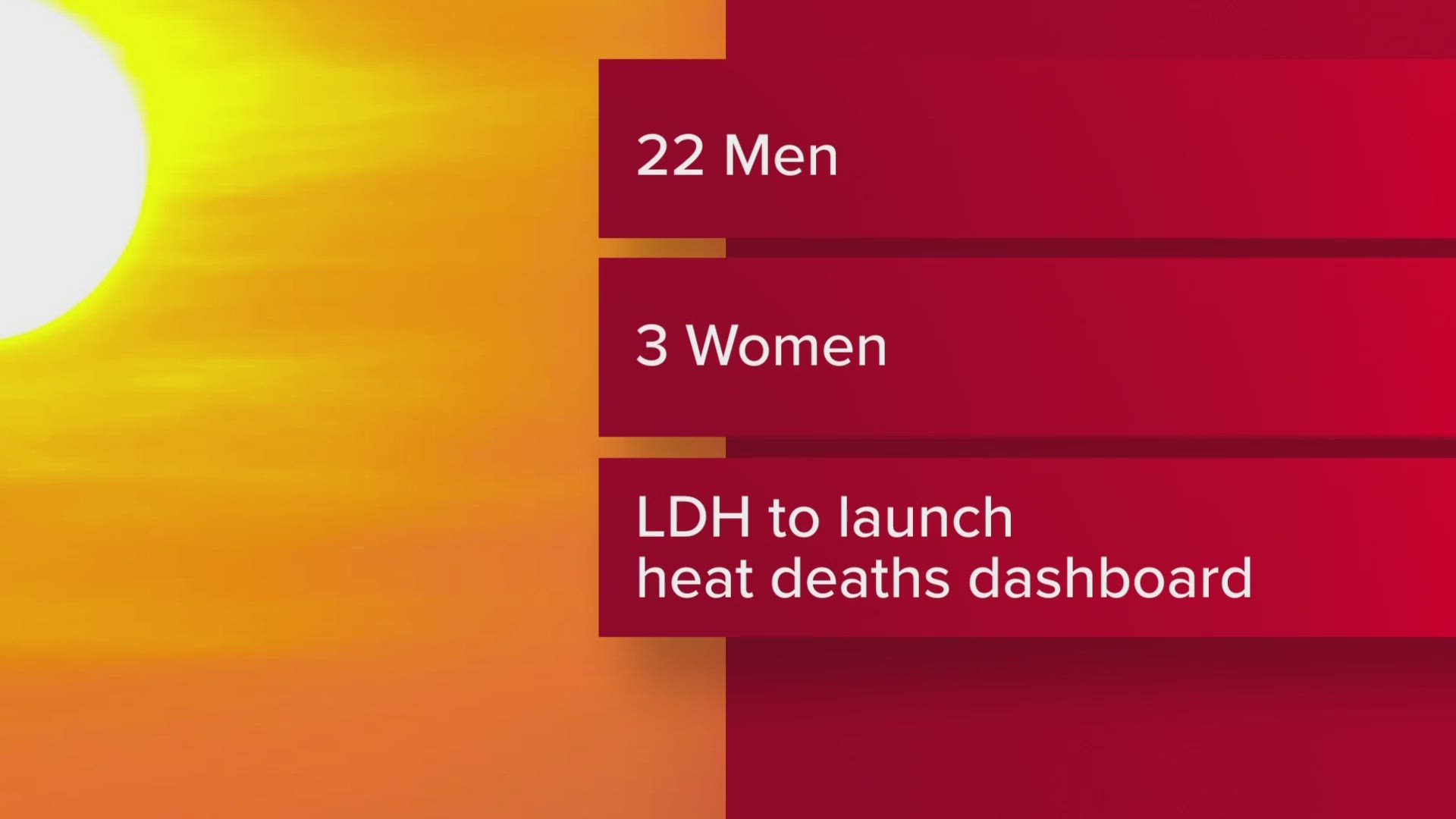NEW ORLEANS — The Louisiana Department of Health says 25 people have died due to heat-related illness in the months of June, July, and August.
22 of the deaths were men, and three were female. LDH says that's because men are more likely to work outdoors.
Here is the age breakdown of those deaths:
- 30-49: 7
- 50-64: 6
- 65+: 12
LDH says they have been monitoring heat-related emergency department visits since April using syndromic surveillance and began examining heat-related deaths using death records due to the record number of Excessive Heat Warnings issued by the National Weather Service.
“Every life lost to a heat-related cause is tragic, and it is a reminder that excessive heat can carry dangerous health consequences,” said LDH Secretary Stephen Russo. “It is critical that everyone in Louisiana take precautions during extreme heat events, especially workers in physically demanding occupations who are frequently outdoors. Heat-related illness and death are preventable, and I encourage Louisiana residents to know the signs of heat-related illness, stay indoors with air conditioning if possible, and remember to hydrate, rest and stay in the shade if they must be outdoors. They should also check on their neighbors, and loved ones, especially those who are elderly.”
LDH says they plan to launch a dashboard that will show heat-related deaths. It will be updated weekly.
Six heat-related deaths also were reported in New Orleans this month. In response, Mayor LaToya Cantrell issued a city emergency. A week later, when temperatures spiked again, Governor John Bel Edwards issued a statewide emergency.
LDH suggests the following guidance for public messaging warning people of the danger extreme heat poses to public health:
- Extreme heat is dangerous. Exposure to heat greater than or equal to 95 degrees can lead to heat stress, resulting in heat-related illness. Heat stress and heat-related illness occur when the body cannot cool itself enough to maintain a healthy temperature.
- Heat stress can be fatal.In Louisiana, heat was the most common cause of death during hurricanes Delta, Zeta, Laura and Ida.
- Of the 65 deaths attributed to the four storms collectively, 23 were due to extreme heat.
- Know what to do about heat exhaustion.
- Heat exhaustion symptoms can include muscle pain or spasms; cold, pale, clammy skin; tiredness or weakness and dizziness; and headache and fainting.
- Move to a cool place and loosen your clothes, put a cool, wet cloth on your body or take a cool bath.
- Sip on water, and seek medical attention if you’re throwing up and/or if your symptoms last longer than an hour.
- Know what to do about heat stroke.
- Heat stroke symptoms can include a high body temperature (103F or higher); hot, red, dry or damp skin; fast, strong pulse; headache and dizziness; nausea and confusion; and loss of consciousness (passing out).
- Call 911 right away: Heat stroke is a medical emergency.
- Move to a cool place and loosen your clothes, put a cool, wet cloth on your body or take a cool bath.
- Do not drink anything.
- Be aware of your risk.Groups at higher risk of heat-related illness include:
- Outdoor workers
- Individuals with heart, lung and/or kidney disease, high blood pressure, diabetes and obesity
- Pregnant women
- Older adults
- Athletes
- Young children
- Air conditioning is the strongest protection against heat-related illness. Exposure to air conditioning even for a few hours a day will reduce the risk of health-related illness. If your air conditioning is not working, go to a public place with electricity, like a library or mall, or local heat-relief shelters. Follow the news and social media, including LDH and local health departments, for locations.
- Drink plenty of fluids. Don’t wait until you’re thirsty. Avoid alcohol, caffeine and sugary drinks.
- Stay in the shade.
- Limit outdoor activity to morning and evening hours.
- Check on people who live alone, especially the elderly.
► Get breaking news from your neighborhood delivered directly to you by downloading the new FREE WWL-TV News app now in the IOS App Store or Google Play.

